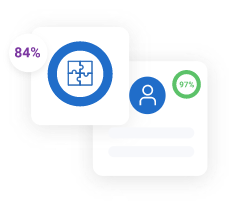- Application
- Information
Apply through Brive
We are official partners! Complete your application for free and earn benefits!
Free review on your application |
1:1 counselling by certified consultants |
Higher acceptance rate on your top choices |
Duration
4 Years
Language
English
Exclusive Scholarships for Greek Applicants
This program is offered 100% online with exclusive scholarships for Greek applicants. Apply through Brive.
Schedule a free callProgram Description
The Bachelor in Computing (with Foundation) (Online) (BA) degree will provide students with the knowledge and skills required to become computing professionals.
The degree offers a unique opportunity for learners to develop a wide range of computing skills including, but not limited to, cyber security, data science, artificial intelligence, web development, networking and software engineering.
Applications are accepted on a rolling basis, with start dates available monthly.
Delivered through Unicaf
The degree offers a unique opportunity for learners to develop a wide range of computing skills including, but not limited to, cyber security, data science, artificial intelligence, web development, networking and software engineering.
Applications are accepted on a rolling basis, with start dates available monthly.
Delivered through Unicaf
Entry Requirements

Are you eligible to apply?
Sign up, check the entry requirements, and find out your compatibility with the program.
Program Aims
- Provide students with a thorough grounding in the practical and theoretical fundamentals that underpin the discipline of computing.
- Enable students to demonstrate problem-solving and evaluation skills in the design, development and testing of technological solutions to solve well-specified problems.
- Develop students understanding and application of concepts, principles and practices in the context of well-defined computing scenarios, showing judgment in the selection of appropriate tools and techniques.
- Develop students command over the management of computing projects consistent with industry best practices and methodologies.
- Develop students’ ability to effectively communicate their work to diverse audiences through written formats.
- Help students develop the interpersonal qualities and professional attributes required by employers including reliability, integrity, ethical approach, dependability and reflection.
- Enable students to become effective independent learners by taking responsibility for their learning and professional development.
More
Learning Outcomes
Knowledge and understanding
- Expressed and employed detailed knowledge and systematic understanding of essential facts, concepts, principles and theories, both established and emergent, relating to specialisms in computing
- Expressed and employed knowledge and understanding of information security issues in relation to the design, development and the use of information systems
- Understood, described, and commented upon the literature and cutting-edge research in computing, and appreciated the associated uncertainties, ambiguities, and limits to knowledge at the forefront of the discipline.
Cognitive Skills
- Applied methods and techniques learned in computing and specialist topics to consolidate, extend, and apply knowledge and understanding to extended realistic and real-world projects
- Applied detailed knowledge, systematic understanding, and mastered techniques to initiate and execute their final-year project and multiple minor projects in different topic areas
- Critically evaluated arguments, concepts, requirements, constraints and data to make rational judgements on appropriate algorithms, designs, methods, and configurations leading to the necessary analysis, design, implementation, and/or testing of solution or identification of a class of solutions to significant problems
- Presented ideas, information, analyses, designs, implementations, tests and results relating to computing, critically, comprehensibly and succinctly to both specialist and non-specialist audiences
Subject-specific skills
- Deployed appropriate established and/or cutting-edge theory, practices and tools for the successful design, development, deployment and maintenance of computer-based systems
- Recognised the legal, social, ethical and professional issues involved in the exploitation of computer technology and be guided by the adoption of appropriate professional, ethical and legal practices
- Researched, designed, implemented, tested, utilised and documented solutions to address specific problems, using their knowledge, understanding and technical skills in computing
Key/transferable skills
- Developed an understanding of a specialist subject or problem area in computing to a level where they can effectively evaluate it, analyse possible solutions, design an appropriate solution and bring that solution to a successful conclusion in a defined time-frame, showing by doing so their capabilities and readiness for lifelong learning and professional training
- Evidenced the qualities and transferable skills necessary for graduate level employment requiring the exercising of initiative, personal responsibility, and decision making, through working individually and in groups on mini-projects, extended case studies and scenarios, and their major project
- Identified appropriate practices considering equality, diversity, and inclusion (EDI) as well as any economic, social, and environmental impact
More
Curriculum
Outdated Content
The content has not been updated in the last 6 months
Need help applying to this program?
Schedule a free 20-minute counseling session today!